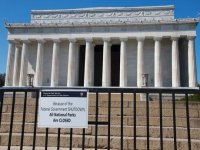3 Leadership Lessons from the Government Shutdown
Your content has been saved!
Go to My Saved Content.It's been a trying time for our government and our country. Decision-making, often unbearably slow, was at a standstill for 16 days. Many waited to return to work, and the economy hung in the balance. Regardless of your political leanings, it is tough to think of our government as being in any type of position to provide lessons in leadership. Yet, as a mentor of mine once shared, "You can often learn more about true leadership from failures than you can from outright successes." And though the realm of politics can be quite different from education, it is amazing (and perhaps a bit frightening) just how many corollaries there are between our two worlds.
So, what lessons have I gleaned from the "Calamity in the Capitol?" I submit to you the following three big ideas:
Lesson One: Evade Entrenchment
In education, just as in politics, it can become very easy to take a position and hunker down. No one likes to be told they are wrong, and people like even less to have it proven to them. Both parties of our government have dug a hole, and for 16 days, they sat in it. The problem with entrenchment is that it welcomes no feedback and is open to no constructive criticism. When we become entrenched, we refuse to entertain any other viewpoints, further polarizing ourselves.
In education, the effects of entrenchment can be dramatic. Leaders who believe it is "my way or the highway" can force teacher flight to new schools, new districts or, in the worst case, new professions. Teachers who resist opportunities for professional learning miss the chance to truly become lifelong learners. How do we avoid becoming entrenched?
First, we listen. It is rare that anyone is totally wrong. Rather, there is often a kernel of truth to every statement. By listening first, and then processing information to make a decision, we can work with feedback rather than throw it away. Second, we must always welcome new experiences. That might mean moving into a leadership role, teaching a new subject or (as would also apply to our politicians) engaging in positive conversation with those whose views are different from our own.
Lesson Two: Embrace Doubt, But Don't Let It Lead to Inaction
No one ever wants to believe that their decision might be wrong, yet without the lessons of doubt, we would never have the forethought to try something different the next time around. Effectively employing doubt allows us to identify as many variables as possible; and by running through multiple scenarios, well-considered responses can be designed to solve problems. Unfortunately, doubt can also be paralyzing. If we consider too many options, we'll never take action, which is often worse than taking a wrong step. The government shutdown is a great example of doubt-based inaction. Both sides, for reasons tied to future election worries, refused to take certain steps due entirely to doubt of outcome. This leads to a double dose of inaction. On one side, entrenchment leads to the belief that one's views are right; on the other, doubt-based inaction says, "Well, what if I'm actually wrong?"
This type of inaction happens often in school systems. Leaders spend more time convening meetings, seeking feedback and doing research (all important steps), but no time actually "doing something" to solve problems. Leaders often have the tough job of making their bed and then lying in it. But if all we do is make the bed, then how do we know if we actually made it well? To avoid doubt-based inaction, start small. Use a problem-solving approach to assess small situations, and then make a decision. Deal with the repercussions, adjust and move on. Continue with small changes until you feel confident that you can tackle the bigger ones.
Lesson 3: Celebrate (Rather than Censor) Other Voices
In education (and politics, for that matter), with so many stakeholder groups, it can be tough for everyone to make their voices heard. But if leaders want to build capacity and foster "buy-in," then everyone has to have a say, and nobody can assume that anyone's voice rings loudest. Even when fully functioning, our government appears to have forgotten this fact, with constant rebuttals turning people's words against them. Nothing can be accomplished in an environment of mistrust, and with everyone in Washington calling everyone else a liar, it can be tough to separate fact from fiction. This lesson is actually the easiest of the three to put into practice. Simply let people speak, listen to them intently, and then make a decision based on evidence. As long as all voices are heard, decisions will always be partially right.
It would be great if our government took these lessons to heart. It would be even better if these lessons were so ingrained in our practice that they didn't even need to be discussed. But even the darkest clouds have silver linings. The government shutdown and subsequent shenanigans have helped clarify for me the importance of these three ideas, and it is my hope that this reflection has done the same for you.
